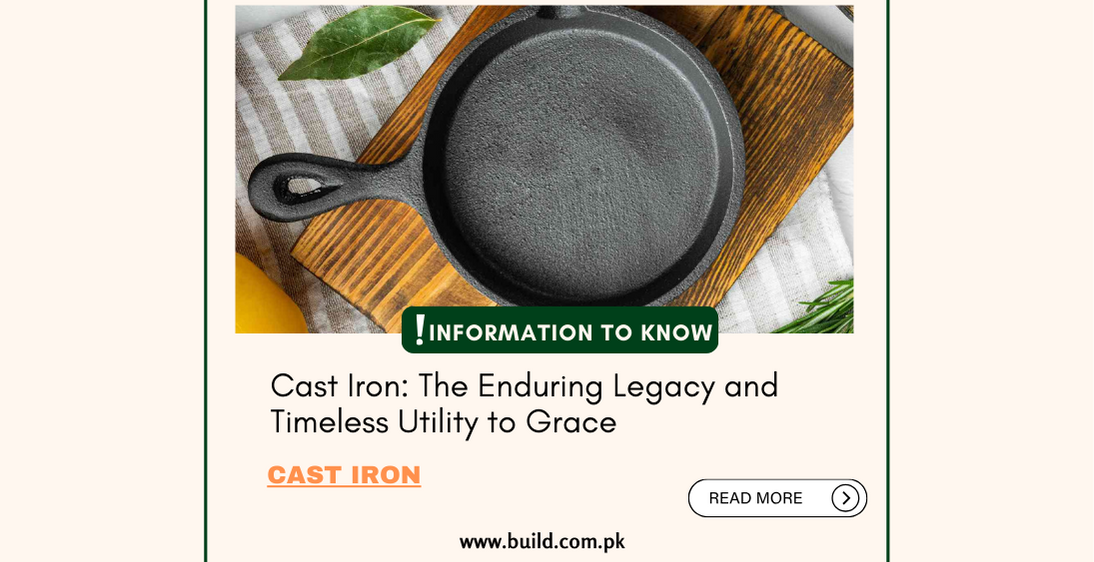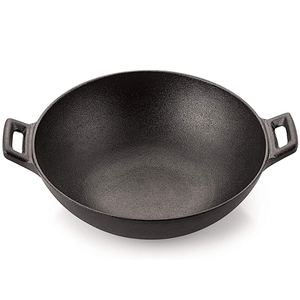Cast Iron: The Enduring Legacy and Timeless Utility to Grace

Introduction:
Cast iron, a stalwart material revered for centuries, stands
as a symbol of durability, versatility, and craftsmanship. From its historical
significance to its modern-day culinary and industrial applications, the story
of cast iron is one woven with resilience, adaptability, and an enduring
legacy.
Understanding Cast Iron:
Cast iron, primarily an alloy of iron and carbon, derives its
name from the casting process where molten metal is poured into molds. Its high
carbon content gives it strength, durability, and the ability to be cast into
intricate shapes.Renowned for its versatility, cast iron finds application
across various industries. From cookware to industrial machinery, its
robustness, and heat-resistant properties make it indispen sable.Proper
maintenance, including seasoning for cookware, is crucial for cast iron
longevity. Seasoning involves coating the surface with oil and baking it to
create a natural non-stick coating, ensuring durability and enhanced cooking
performance.
Historical Significance:
Cast iron's roots trace back to ancient civilizations, where
its robustness made it a cornerstone in various applications. The Iron Age
ushered in a new era, where cast iron became the backbone of construction, weaponry,
and household tools, revolutionizing industries and shaping civilizations.

Versatility and Applications
Culinary Superiority:
In the culinary world, cast iron cookware reigns supreme. Its
unparalleled heat retention, even distribution, and durability make it a
kitchen staple for chefs and home cooks alike. From skillets to Dutch ovens,
its versatility allows for cooking methods spanning searing, baking, frying,
and more.
Industrial Foundations:
Cast iron's strength and malleability led to its widespread
use in manufacturing machinery, pipelines, and infrastructure. Its resilience
to high temperatures and stress made it integral to the Industrial Revolution's
growth and development.
Architectural Significance:
Cast iron's structural properties influenced architectural
design. Its use in ornate facades, columns, and decorative elements adorned
buildings worldwide, adding aesthetic grandeur and durability to architectural
marvels.
Unveiling Benefits
Exceptional Durability:
Cast iron's robustness grants it exceptional longevity, with
well- maintained items lasting generations. Its ability to withstand high
temperatures and wear ensures sustained functionality.
Superior Heat Retention:
In the kitchen, cast iron's ability to evenly distribute and
retain heat aids in precise cooking, ensuring consistent results and enhanced
flavors in dishes.
Health Benefits:
When seasoned properly, cast iron cookware develops a natural
non-stick surface without synthetic coatings, offering a healthier alternative
for cooking.
Multi-Generational Utility:
Passed down through families, heirloom cast iron pieces not
only retain their functionality but also carry sentimental value, forging
connections across generations.
Market Availability of Cast Iron
Cookware and Kitchen Utensils:
Cast iron cookware, including skillets, Dutch ovens, and
griddles, is widely available in kitchenware stores, online retailers, and
specialty shops. Reputable brands offer a range of sizes and designs to cater
to diverse culinary needs.
Industrial and Machinery:
In industrial sectors, cast iron components and machinery
parts are available through specialized manufacturers and suppliers. These
components serve a broad spectrum of applications, including automotive,
construction, and heavy machinery industries.
Architectural and Decorative:
For architectural purposes, cast iron elements like columns,
railings, and ornate pieces are available through architectural salvage yards,
specialty suppliers, and restoration companies. They cater to restoration
projects or design enthusiasts seeking vintage architectural elements.
Conclusion:
Cast iron stands as a testament to resilience, adaptability,
and enduring utility. Its versatility spans culinary mastery, industrial
foundations, and architectural splendor, weaving itself into the fabric of
human progress and heritage. The legacy of cast iron continues to evolve,
embodying a timeless fusion of craftsmanship, durability, and multifaceted
utility that transcends generations.
From the sizzling melodies of a well-seasoned skillet to t he
industrial symphony of machined components, cast iron's story continues to echo
through time, leaving an indelible mark on human history and innovation.









